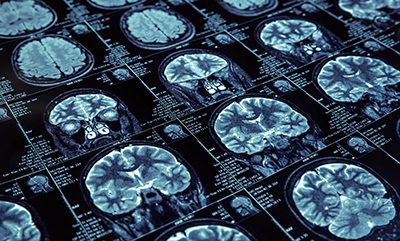Possible Biomarker for Diagnosing CTE During Life Identified.
 A new biomarker (CCL11) for chronic traumatic encephalopathy (CTE) has been discovered that may allow the disease to be diagnosed during life for the first time, according to a study co-authored by a School of Public Health researcher.
A new biomarker (CCL11) for chronic traumatic encephalopathy (CTE) has been discovered that may allow the disease to be diagnosed during life for the first time, according to a study co-authored by a School of Public Health researcher.
The findings, which appear in the journal PLOS ONE, might also help distinguish CTE from Alzheimer’s disease, which often presents with symptoms similar to CTE and also can only be diagnosed post-mortem. The ability to diagnose CTE in living individuals will allow for research into prevention and treatment of the disease.
Researchers from the School of Medicine, SPH, and the VA Boston Healthcare System studied the brains of 23 former college and professional football players. They compared them to the brains of 50 non-athletes with Alzheimer’s disease and 18 non-athlete controls.
They observed that CCL11 levels were normal in the brains of the non-athlete controls and non-athletes with Alzheimer’s disease, but were significantly elevated in the brains of individuals with CTE. They then compared the degree of elevation of CCL11 to the number of years those individuals played football and found that there was a positive correlation between the CCL11 levels and the number of years played.
The researchers also took post-mortem samples of the cerebrospinal fluid (CSF) from four of the control individuals, seven of the individuals with CTE and four of the individuals with Alzheimer’s disease, and found that CCL11 levels in the CSF were similarly normal in the control and Alzheimer’s individuals, but elevated in those individuals with CTE, suggesting that the presence of CCL11 in the CSF might be able to assist in the detection of CTE during life.
“Not only did this research show the potential for CTE diagnosis during life, but it also offers a possible mechanism for distinguishing between CTE and other diseases. By making it possible to distinguish between normal individuals, individuals with Alzheimer’s disease, and CTE therapies can become more targeted and hopefully more effective,” said first author Jonathan Cherry, a postdoctoral fellow in neurology at MED.
“The findings of this study are the early steps toward identifying CTE during life. Once we can successfully diagnose CTE in living individuals, we will be much closer to discovering treatments for those who suffer from it,” said senior author Ann McKee, director of the BU CTE Center and Chief of Neuropathology at VABHS.
Yorghos Tripodis, assistant professor of biostatistics, was a co-author on the study.
Future studies are needed to determine whether increased levels of CCL11 are an early or late finding in the CTE disease process and whether CCL11 levels might be able to predict the severity of an individual’s disease.
CTE is a progressive degenerative disease of the brain found in athletes and others with a history of repetitive brain trauma, including symptomatic concussions as well as asymptomatic sub-concussive hits to the head. Although the incidence and prevalence of CTE is unknown, it has been diagnosed in former amateur and professional contact sport athletes as well as military veterans. Given the millions of contact sport athletes and military service members exposed to repetitive head impacts each year, CTE has become a major public health concern.